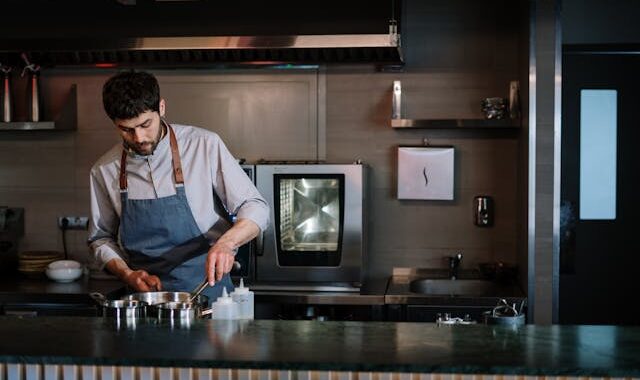
7 min
8 Tips to Retain your Culinary Staff and Cultivate a Positive Work Culture
Written by
The heartbeat of every restaurant, hotel, or food service operation? The culinary staff. They’re the hands behind every plate, the minds behind every menu, and the soul behind every dining experience. For HR Directors, building and managing this team goes beyond recruitment — it’s about creating a high-performing, scalable, and loyal workforce that delivers excellence every single day.
In the fast-paced, high-pressure environment of any culinary institution, where long hours and demanding tasks are the norm, fostering a positive work culture becomes paramount. It’s about creating a space where faculty, staff, and even students feel valued, respected, and motivated. Whether you’re overseeing staffing for a multi-location hospitality group or navigating the tight labor market in luxury resorts, understanding the ins and outs of culinary staffing is mission-critical.
Like any organization, the success of a culinary institue hinges not only on its facilities but also on its ability to cultivate a positive and supportive work culture. This culture directly impacts employee retention, which, in turn, influences the quality of service and the overall reputation of the institution.
This article delves into the essential ingredients for creating such a culture, focusing on strategies that promote employee retention and contribute to the long-term success of the culinary industry. So let’s dig in.
Related articles:
Good Talent Management: Your Ultimate Guide
How to Attract and Retain Top Talent in Marketing Agencies
Who Makes Up a Culinary Staff?
Let’s clear something up right away. Culinary staff isn’t just “chefs and cooks.”
The term covers a full spectrum of roles within a kitchen or food production setting. Think of it like a well-choreographed performance:
- Executive Chef – The conductor of the kitchen.
- Sous Chef – The second-in-command, managing execution and consistency.
- Line Cooks – The reliable soldiers, mastering stations from grill to sauté.
- Pastry Chef/Baker – The artists of sugar and dough.
- Prep Cooks – The backbone, keeping everything chopped, portioned, and ready.
- Dishwashers – The unsung heroes keeping things moving behind the scenes.
- Kitchen Porters, Stewards, and Expeditors – The glue between front and back of house.
These roles may vary by establishment, but the goal is the same: smooth operations and top-tier food service.
Because culinary teams are notoriously hard to hire, train, and retain. The stakes are high: quality dips when the team underperforms, and customer loyalty quickly follows.
Why is Culinary Staffing So Complex?
Before we explore the solutions, it’s crucial to acknowledge the unique challenges that culinary institutions face. These challenges stem from the inherent nature of the culinary industry itself.
- High-Stress Environment: Culinary work is notoriously demanding, often involving long hours, tight deadlines, and intense pressure. This can translate into a stressful work environment for ant culinary staff, potentially leading to burnout and high turnover.
- Labor Resources: Working in a kitchen is already hard work. Add high turnover, staffing shortages, and wage inflation to the mix, and you’ve got a recipe for HR headaches.
- Balancing Art and Industry: A “good dish” is open to interpretation. Thus, culinary institutions need to balance their creative tendencies with the practical realities of the culinary industry. This can create tension between theoretical learning and hands-on experience, impacting the work culture.
- Unique Work Culture: Unlike office-based teams, kitchens often operate on tradition, hierarchy, and unspoken rules.
- Rapid Industry Evolution: The culinary industry is constantly evolving, requiring culinary leaders and staff to stay abreast of the latest trends and techniques. This can create a sense of pressure to constantly learn and adapt.
So how do you approach these challenges strategically? That’s where creating a positive work culture comes in to play.
The Impact of a Positive Work Culture on Retention
A positive work culture directly impacts employee retention in several ways:
- Increased Job Satisfaction: Staff who feel valued, respected, and supported are more likely to be satisfied with their jobs
- Reduced Turnover: A positive work culture reduces the likelihood of employees leaving the organization
- Enhanced Productivity: Happy and engaged staff members are more productive and motivated
- Improved Reputation: A positive work culture enhances the reputation of a restaurant or its associated culinary school, attracting both students and top talent
Let’s take a look at several ways that HR leaders can help cultivate a positive work culture in a culinary institution.
8 Actionable Tips for Culinary Staff Retention
1. Prioritize Transparent Communication
Open, honest communication builds trust. And trust builds loyalty.
Establish reliable channels to keep faculty and staff informed about key decisions, policy changes, and institutional goals.Use consistent touch points: regular team huddles, internal newsletters, and online platforms.
Most importantly, foster two-way dialogue. Invite feedback, listen actively, and act on input. When people feel heard, they stay.
2. Recognize and Celebrate Contributions
Recognition is retention fuel.
Go beyond generic praise and consider launching structured recognition programs. Think Employee of the Month, peer-nominated awards, or spontaneous shout-outs. Acknowledge wins of all sizes: a standout class, an innovative lesson plan, or mentoring a new instructor.
Never underestimate the power of a genuine “thank you.” It’s simple, free, and remarkably effective.
3. Invest in Professional Growth
Stagnation is a flight risk. Growth drives loyalty.
Offer ongoing career development through workshops, certifications, and industry conferences. Encourage and financially support advanced degrees or continuing education. Culinary techniques evolve, so your team should, too. Give them the tools to stay sharp, inspired, and ahead of the curve.
4. Support Work-Life Balance
Culinary professionals are no strangers to burnout. Prevent it.
Where possible, offer flexible schedules and mental health days. Discourage a culture of overtime and normalize unplugging after hours.
Model balance from the top down — when leaders take care of themselves, teams follow suit.
5. Build a Culture of Teamwork
Collaboration breeds connection.
Organize team-building activities and social events to promote camaraderie. Create opportunities for cross-departmental collaboration to break down silos and enhance communication. Consider mentioning how flex space software can facilitate cross-departmental collaboration and team-building activities.
6. Offer Competitive Pay and Benefits
Conduct market-based salary audits and adjust proactively. Be transparent about pay structures. You can also offer robust benefits such as health coverage, retirement plans, paid leave, wellness stipends.
These aren’t perks; they’re essentials.
7. Lead with Empathy and Purpose
Leadership sets the tone for retention.
Culinary faculty thrive under leaders who are supportive, approachable, and mission-driven. Train your leaders in emotional intelligence and conflict resolution.
Lead by example. Be visible, present, and consistent. Offer mentorship, not micromanagement.
8. Foster an Inclusive, Respectful Workplace
A thriving kitchen starts with a safe, welcoming space.
Implement and enforce zero-tolerance policies on harassment and discrimination. Go beyond compliance and cultivate real belonging. Celebrate the diversity of culinary traditions, cultures, and identities.
Streamline Operations with the Right HR Technology
Behind every great team is a system that keeps everything running smoothly.
Manual processes, disconnected tools, and outdated systems drain your HR team’s time and frustrate your staff. To truly support your culinary workforce, you need a centralized platform that unites all your HR needs — from onboarding and training to scheduling, payroll, and performance reviews.
PeopleSpheres offers a customizable HR platform designed specifically for restaurant and hospitality environments. Whether you’re managing a single culinary institution or a nationwide chain of training centers, the solution adapts to your structure — helping you centralize data, automate workflows, and deliver a better employee experience from day one.
Creating a Lasting Legacy
Want to keep your best talent? Focus on what truly matters to them: purpose, respect, and growth. Because when people feel seen, supported, and valued, they don’t leave — they lead.
Cultivating a positive work culture is an ongoing process that requires commitment and effort. However, the rewards are significant. By prioritizing the well-being of their culinary staff, institutions and restaurants can create a thriving environment that fosters excellence, innovation, and long-term success. The resulting legacy is not just a school that produces great chefs, but a school that demonstrates how to treat people well.




